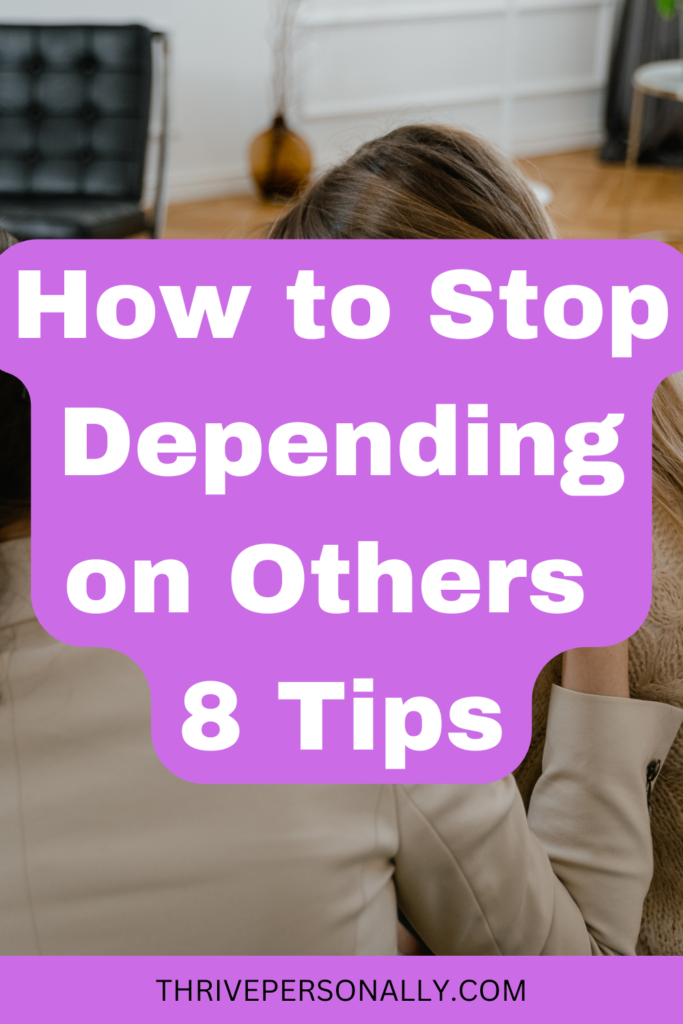Dependence on others is a common experience that many individuals face throughout their lives. In its simplest form, dependence means relying on someone else for support, decisions, or emotional stability. This reliance can manifest in various ways, such as leaning on friends during difficult times for emotional support or counting on family members to make routine decisions on your behalf.
During periods of stress or change, it is natural to seek help from those around you. This response can be comforting, as it provides an immediate sense of security. However, depending on others excessively can hinder your sense of autonomy and personal growth.
You may notice that your ability to make independent choices becomes diminished, gradually leading to feelings of uncertainty or self-doubt. In our daily lives, reliance on friends and family can sometimes feel like an essential part of our social fabric, yet it is important to reflect on whether this reliance is empowering you or limiting you.
How to Stop Depending on Others
1. Recognizing Your Feelings
As you embark on the journey to stop depending on others, it’s essential to take a moment to examine your emotions surrounding dependence. You may notice a range of feelings, from fear and anxiety to uncertainty and self-doubt. These emotions are entirely normal and common among individuals seeking independence. Acknowledging that experiencing these feelings is part of the process can empower you to move forward.
Dependency often stems from longstanding patterns in your life. You might have relied on others for emotional support, decision-making, or even daily tasks. While it is natural to lean on family, friends, or mentors, recognizing the areas where you may be overly reliant is crucial. Allowing yourself to feel scared or uncertain about breaking these patterns is not a sign of weakness; it is a step toward personal growth.
A practical approach to help you understand your feelings better is to keep a journal. Writing down your thoughts and emotions can provide clarity and insight into your dependence. As you document your feelings, you might begin to recognize patterns that highlight specific triggers causing reliance on others.
Read Also: 10 Ways to Improve Your Emotional Intelligence
2. Becoming Self-Reliant
Self-reliance is a critical aspect of personal growth that empowers you to take charge of your own life. When you cultivate self-reliance, you develop the ability to trust yourself and your instincts, which can significantly boost your confidence. When you are confident in your abilities and judgment, you are more likely to make decisions that align with your values and aspirations. This sense of self-assuredness is crucial not only for your mental well-being but also for how you navigate various challenges that life presents.
One of the primary benefits of self-reliance is the enhancement of your problem-solving skills. When you become accustomed to relying on yourself, you learn to think critically and creatively to solve problems without always seeking help from others. This independence fosters a mindset that embraces challenges as opportunities for growth. The more you face obstacles on your own, the better equipped you become to tackle future issues, enhancing your resilience and adaptability.
Moreover, being self-reliant enables you to make your own choices. This autonomy allows you to determine the paths you wish to take, free from the influence or expectations of others. You can explore what truly fulfills you, whether it’s pursuing your passions, career goals, or personal interests. As a result, you may find that life becomes more meaningful and rewarding when you take ownership of your decisions.
Read Also: 8 Signs You Are an Emotional Person
3. Setting Personal Goals
To foster your independence, setting personal goals can be an effective method. By focusing on small, achievable targets, you can gradually reduce your reliance on others. This practice encourages you to build self-confidence and promotes a sense of accomplishment. To embark on this journey, begin by identifying specific areas in your life where you want to gain more independence.
For instance, learning a new skill can be an excellent goal. Whether it’s cooking, gardening, or mastering a software application, dedicating time to acquire new knowledge empowers you to handle tasks on your own. Start with a manageable goal, such as trying one new recipe each week or devoting a short period daily to practice a skill. As you succeed in achieving these objectives, you’ll notice a gradual decrease in your dependence on others for assistance.
Another practical goal is to make decisions independently. This can involve simple choices, like selecting what to wear or planning your weekend activities without seeking input from others. Gradually increase the complexity of your decisions, allowing yourself to trust your judgment. By doing so, you will develop confidence in your ability to make sound choices, fostering a sense of independence.
Read Also: 20 Achievable Goals to Help You Grow and Improve
4. Building Your Skills
To stop depending on others, one of the most crucial steps is to focus on building your skills. Developing strong decision-making, problem-solving, and time management skills will empower you to navigate life’s challenges more independently. These skills are essential for fostering a sense of self-reliance and confidence in your abilities.
Firstly, decision-making skills are vital. You can enhance these skills by practicing making choices on a daily basis. Start with small decisions, such as what to wear or what to eat, and gradually increase the complexity of your choices. Books like “Decisive” by Chip Heath and Dan Heath provide effective strategies for improving your decision-making processes. Additionally, online courses or workshops can offer structured guidance and practical exercises.
Next, problem-solving skills can be honed by approaching challenges as opportunities for growth. You might confront real-life problems by analyzing the situation, brainstorming possible solutions, and evaluating the outcomes. Engaging in puzzles, games, or coding challenges can help sharpen your analytical thinking. Resources like TED Talks and educational YouTube channels focused on critical thinking can provide valuable insights and inspiration.
5. Creating a Support System
Breaking free from reliance on others is a crucial step towards achieving independence. However, it is important to recognize that a strong support system can greatly enhance this journey. Surrounding yourself with positive and empowering individuals can help you develop the skills needed to become more self-sufficient while providing encouragement and motivation. When building your support system, consider the qualities you seek in friends, mentors, and groups.
First, look for individuals who exhibit similar values and aspirations. This could be friends who are also working towards independence or mentors who have successfully navigated this path. These relationships can provide valuable insights and guidance. You may wish to consider joining community groups, workshops, or online forums focused on personal growth and self-sufficiency. Engaging with like-minded people encourages a collective atmosphere of support and determination.
Moreover, it is essential to choose relationships that foster independence rather than reinforce dependence. Critically evaluate your existing friendships and professional connections; ask yourself if they inspire growth or if they hold you back. Healthy relationships promote accountability and self-discovery. They encourage you to explore your capabilities and challenge your comfort zones, ultimately strengthening your sense of autonomy.
6. Managing Fear and Anxiety
Fear and anxiety are common emotions that can significantly hinder your journey toward independence. Understanding and managing these feelings is essential for personal growth and self-reliance. It is important to acknowledge that fear of failure and anxiety about change are normal experiences that everyone encounters. When you decide to become more independent, these emotions may intensify, but you can learn effective strategies to manage them.
One useful technique for managing fear and anxiety is mindfulness. Practicing mindfulness allows you to focus on the present moment without judgment. By engaging in activities like deep breathing, meditation, or simply observing your thoughts, you can create a sense of calmness. This practice helps you become more aware of your feelings, enabling you to confront them more effectively rather than letting them control you.
An additional approach is to communicate your fears with someone you trust. Talking about your concerns can provide relief and offer new perspectives. Whether it’s a friend, family member, or a professional counselor, discussing your feelings can help normalize your experiences and allow for shared understanding. This social support is vital when striving for independence, as you can gain encouragement and insights from those who care about you.
7. Practicing Patience
Developing independence is a significant journey that often takes more time than you might expect. It is important to recognize that progress may come in small steps, and it is perfectly normal for the process to feel slow at times. This journey is unique for everyone, and it requires a commitment to being kind to yourself along the way. Each time you challenge yourself to rely less on others, you are moving closer to achieving your goal of independence, and every step forward is a step worth celebrating.
As you embark on this path, patience becomes a crucial virtue. It is easy to become frustrated when you feel you are not making enough progress. However, it is essential to understand that independence is not achieved overnight; it is a gradual process. Allow yourself to make mistakes and learn from them. By doing so, you give yourself the space to grow and adapt, which is fundamental in developing autonomy. Remind yourself that even the smallest progress can have a significant impact on your overall journey.
Additionally, create a support system that encourages patience and understanding. Sharing your experiences with friends or family who respect your journey can contribute positively to your mindset. In doing so, you will find that practicing patience is not only essential for your growth but also a valuable lesson in self-acceptance as you navigate through the process of becoming more independent.
8. Celebrating Your Progress
As you embark on your journey toward independence, it is crucial to take the time to recognize and celebrate your progress. Each step you take away from depending on others is a testament to your growth and determination. You may not always feel like you are making significant strides, but when you reflect on the path you’ve traveled, you will likely find that the changes you have made are noteworthy.
Perhaps you started by making small decisions on your own or learning a new skill. Recognizing these achievements, no matter how minor they may seem to you, is an important part of building your confidence. You should acknowledge your progress regularly; this reflection will reinforce your commitment to independence and motivate you to keep going. When you allow yourself to celebrate even the smallest victories, you create a positive feedback loop that encourages further growth.
It is also helpful to set specific milestones for your journey. For example, you might aim to make an independent decision in a challenging area of your life or manage a task that you previously relied on others for. Once you achieve these goals, take a moment to treat yourself. This celebration could be as simple as enjoying a favorite meal, spending time with friends, or engaging in a hobby you love. Rewarding yourself fosters a sense of accomplishment that is essential to continuing your process of becoming less dependent on others.
Save the pin for later



